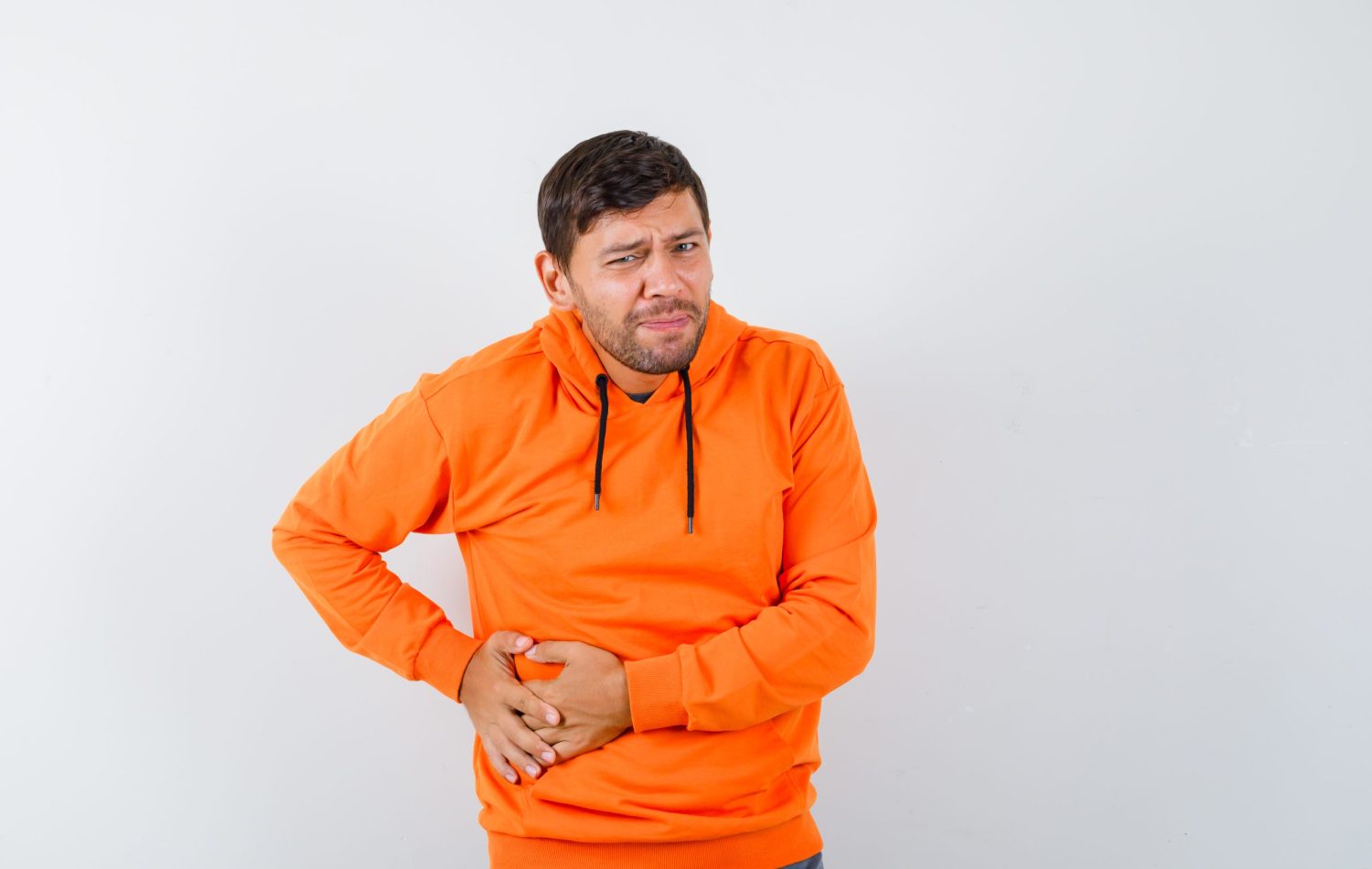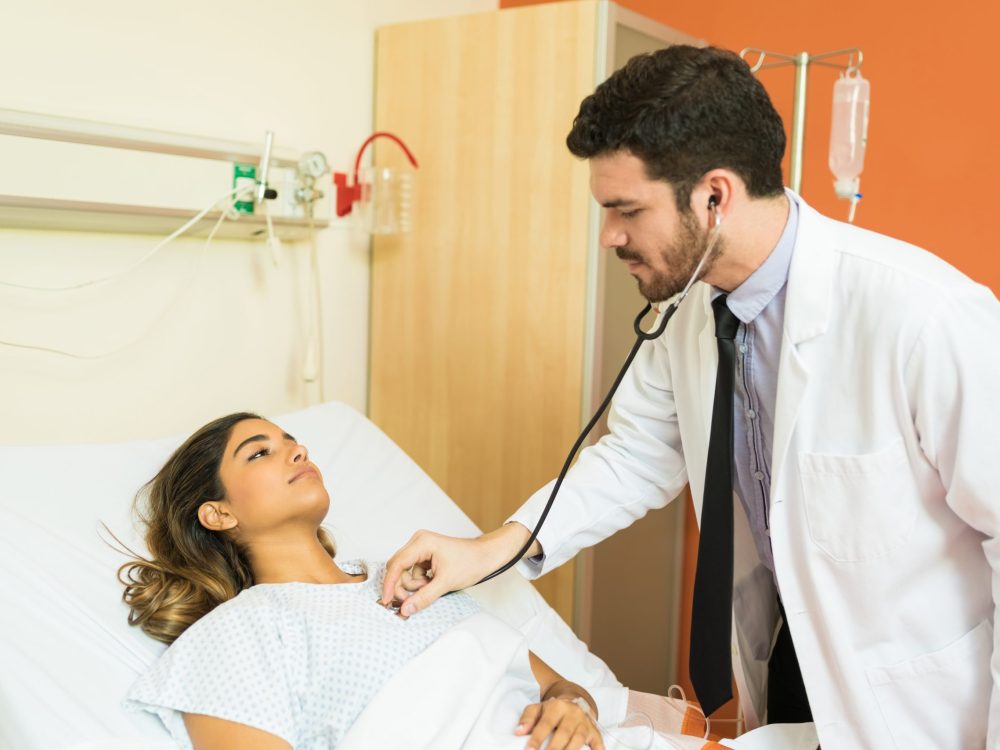Best Doctor for Gas (Flatulence) in Hyderabad

Flatulence is a medical term for the release of gas from your digestive system through your anus. It is commonly known as farting or passing wind. This is a natural bodily function that everyone experiences. On average, a person passes wind anywhere from 10 to 20 times a day. However, excessive or persistent flatulence can cause discomfort and embarrassment. In some cases, it might also indicate a digestive system disorder, such as irritable bowel syndrome.
If you’re experiencing regular bouts of gas and seeking the best doctor for flatulence in Hyderabad, consult Dr. K V Dinesh Reddy. He is one of the best gastroenterologists, offering comprehensive, world-class treatment for gastroenterological disorders.
What causes flatulence?

Intestinal gas is a natural part of the digestion process, and it can happen due to various reasons:
Normal Digestion:
During digestion, your stomach acid is neutralized by pancreatic secretions and produces gas in the form of carbon dioxide as a by-product.
Swallowed Air
When you eat or drink, you might unintentionally swallow air. The oxygen and nitrogen from the air is then absorbed into your bloodstream through your small intestine. Any excess air that isn’t absorbed travels through your digestive system and is eventually expelled through your bowels.

Intestinal Bacteria
Your intestine contains a plethora of bacteria that aid digestion by fermenting certain food components. The fermentation process results in gas as a by-product. While some of the gas is absorbed into the bloodstream and exhaled by the lungs, the remaining is pushed along the bowel.
High-Fiber Foods
Although essential for digestive health, high-fiber foods can lead to excess gas. The small intestine can not break down certain compounds in these foods, requiring additional work from gas-producing intestinal bacteria. This results in flatulence.
Lactose Intolerance:
Some people with lactose intolerance are unable to fully digest lactose (sugar) found in milk. The gut bacteria digest these sugars through fermentation, which produces gas. As a result, they have bloating, diarrhoea, and gas after eating or drinking dairy products.
Intolerance of Short-Chain Carbohydrates (FODMAPs)
Some individuals may be sensitive to gas production from the fermentation of carbohydrates like fructose, present in various foods such as beans, cabbage, and whole grains. These short-chain carbohydrates, collectively known as FODMAPs, can contribute to gas-related issues.
Foods high in fructose or sorbitol, like fruit juices and sugar-free candies, and processed foods can be culprits too.
If your diet is in check and you’re still experiencing a lot of flatulence, it might be due to a medical condition. Conditions including:


- Constipation
- Irritable bowel syndrome
- Crohn’s disease
- Ulcerative colitis
- Gallbladder problems such as gallstones and cholecystitis
- Intestinal viral, bacterial, or parasitic infections like E. coli, amebiasis, or giardiasis
- Use of antibiotics and laxatives
Other factors include pregnancy, hernias, pancreatitis, Hirschsprung disease, premenstrual syndrome, and endometriosis. It is important to pay attention to your body and, if needed, seek advice from the best doctor for flatulence in Hyderabad.
What are the symptoms of flatulence?
In addition to the frequent passing of gas, you may have some of the following symptoms:
- Flatus with a strong odour.
- Loud flatus noises.
- Feeling bloated and uncomfortable in the abdominal area.
- Gurgling sounds in the lower abdomen.
You may also experience pain or discomfort in your stomach or sides. The pain could be mistaken as something else, such as a heart attack or appendicitis. If you are experiencing these symptoms, consult the best doctor for flatulence in Hyderabad to rule out any underlying issues.
When is gas and bloating an emergency?
Some conditions that cause gas, bloating, and abdominal pain can be serious. If you experience the following symptoms along with flatulence get immediate medical help:

- Chest pain
- High fever
- Swollen abdomen
- Severe abdominal pain
- Vomiting
- Constipation
- Unintentional weight loss
- Blood in stool

These signs may indicate a potentially serious underlying condition.
What to expect during your doctor's visit?
When you visit the doctor, you can expect a thorough examination and a conversation about your health history, current medication and dietary habits. He might also do a physical exam to check if your belly feels swollen. Sometimes, the doctor may tap on your belly to listen for a certain sound.
The doctor might inquire about your bathroom habits, such as whether it’s difficult to go or if you experience abdominal pain after eating. He will also ask about the intensity of your gas—whether it’s mild or severe—and if it is linked to specific foods, particularly dairy products.
During the visit, the doctor may discuss any additional symptoms you may be experiencing, such as abdominal pain, diarrhoea, bloating, early fullness after meals, or weight loss.

Based on your situation, the doctor may recommend specific tests, which could include:

- Abdominal imaging like CT scans or ultrasounds
- Procedures such as barium enema and barium swallow X-rays
- Blood tests like CBC or blood differentials
- Endoscopic examination procedures like sigmoidoscopy or upper endoscopy (EGD)
- Breath test to analyze gasses produced in your digestive system
This comprehensive approach helps the doctor understand the root cause of your symptoms and tailor a suitable treatment plan.
What is the treatment for flatulence?
There are several treatment options available to bring you relief:
Normal Digestion
Acute gas problems are relieved by just adjusting your diet without the need for medications. This involves avoiding foods that tend to produce gas. It is better to consult a doctor to help build a well-balanced diet. This ensures that your nutritional needs are met without compromising on food quality while minimizing the likelihood of gas-related issues.
Medications
Certain over-the-counter medications, such as antacids, can help reduce mild to moderate gas issues.You may also be prescribed probiotics to promote a healthy balance of gut bacteria, potentially reducing excessive gas.
For individuals with lactose intolerance, lactase supplements may be prescribed to aid in the digestion of dairy products and reduce associated gas.
In cases where gas is linked to underlying conditions like irritable bowel syndrome (IBS) or small intestinal bacterial overgrowth (SIBO), your doctor may prescribe medications targeted at managing these conditions.
Behavioural Changes
Addressing habits like eating too quickly, chewing gum, or smoking, can contribute to swallowing air and increased gas production.
We can help you with flatulence!
While intestinal gas is common, excessive gas and bloating can be painful, embarrassing, and may even interfere with your daily activities. These symptoms can sometimes indicate serious health problems. Therefore, consult the best gastroenterologist in Hyderabad for the right treatment.
Take the first step towards leading a more comfortable life – schedule an appointment today!
Best Doctor for Gas (Flatulence) in Hyderabad

Dr. K V Dinesh Reddy
MBBS; MS (Gen.Surg); DNB (Surg.Gastro)
It is always advisable to consult with an experienced doctor for personalized advice and an accurate diagnosis. Dr. K V Dinesh Reddy is known for his expertise in Gas (Flatulence) treatment in Hyderabad. With a proven track record of performing multiple liver cancer surgeries, he specializes in liver disease management and gastrointestinal oncological surgeries.
You can trust our expertise and dedication to providing exceptional care for your colorectal cancer treatment.
Frequently Asked Questions
Here are answers to some of the questions you might have about Liver Cancer
Yes, some drinks can definitely cause gas. This mostly happens with drinks that have bubbles, like soda and sparkling water. When you drink these, you’re also swallowing a lot of air, which can make you feel bloated and gassy. Other drinks that might cause gas include those with a lot of sugar or artificial sweeteners, as your body can find these hard to digest. So, if you notice you’re feeling a bit more gassy after having certain drinks, it might be worth cutting back on them or choosing flat, non-sugary options instead.
Gas is a common thing that everyone experiences, and it’s usually not something to worry about. It’s often just a sign that your body is digesting food. However, if you’re feeling a lot of pain, noticing other symptoms like vomiting, diarrhea, constipation, or weight loss along with the gas, then it might be a hint of something more serious. In such cases, it’s a good idea to talk to a doctor to check things out. Remember, everyone’s body is different, and what’s normal for one person might not be for another.
Some foods can make you feel a bit more gassy than usual because they’re tougher for your body to break down. These include beans and lentils, which are full of healthy fiber but can cause gas. Broccoli, cabbage, and onions are also common culprits, along with dairy products like milk and cheese, especially if you find it hard to digest lactose. Whole grains and carbonated drinks, like soda, can also lead to a bit more gas. Each person is different, so you might notice that some of these foods affect you more than others.
When your gas smells bad, it’s often because of the food you’ve eaten. Foods high in sulfur, like eggs, meat, and some vegetables, can make your gas more smelly. When these foods break down in your stomach and intestines, they create gas as a by-product. This gas then mixes with other gases and, when it leaves your body, it might have a strong odor. Each person’s body is different, so some foods might make one person’s gas smell worse than another’s. Drinking plenty of water and eating a balanced diet can help manage smelly gas.


